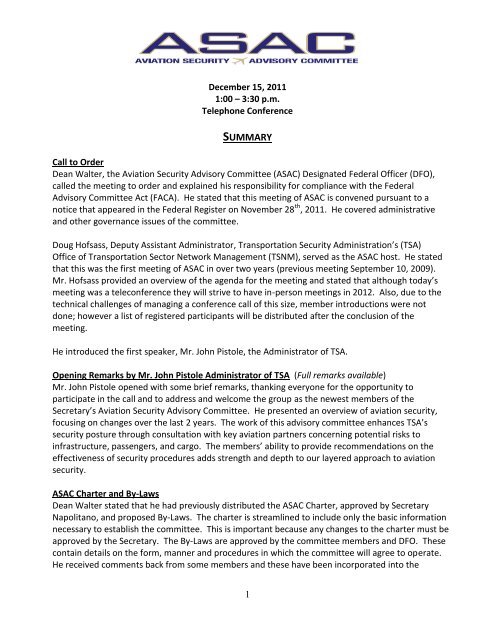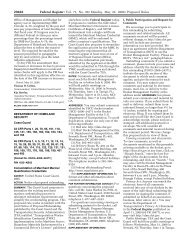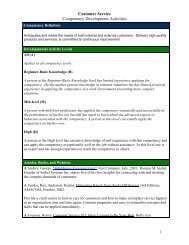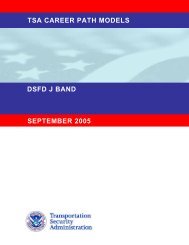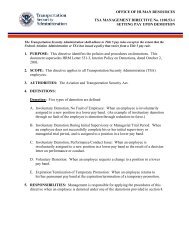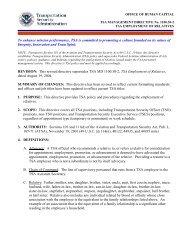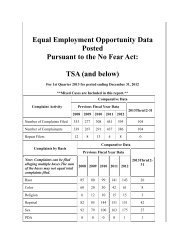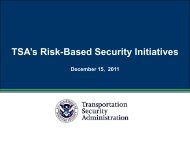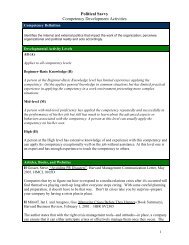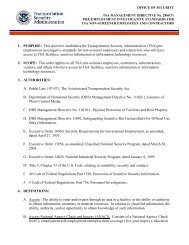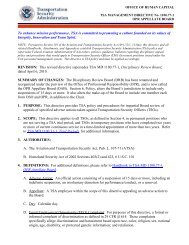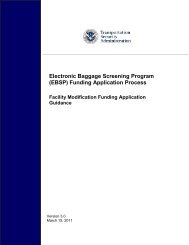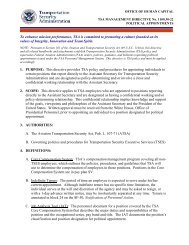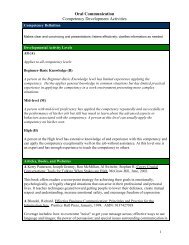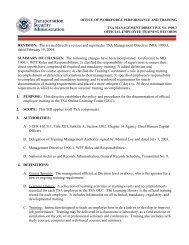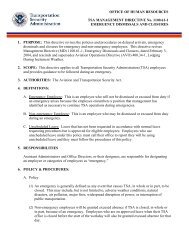asac - Transportation Security Administration
asac - Transportation Security Administration
asac - Transportation Security Administration
You also want an ePaper? Increase the reach of your titles
YUMPU automatically turns print PDFs into web optimized ePapers that Google loves.
December 15, 2011<br />
1:00 – 3:30 p.m.<br />
Telephone Conference<br />
SUMMARY<br />
Call to Order<br />
Dean Walter, the Aviation <strong>Security</strong> Advisory Committee (ASAC) Designated Federal Officer (DFO),<br />
called the meeting to order and explained his responsibility for compliance with the Federal<br />
Advisory Committee Act (FACA). He stated that this meeting of ASAC is convened pursuant to a<br />
notice that appeared in the Federal Register on November 28 th , 2011. He covered administrative<br />
and other governance issues of the committee.<br />
Doug Hofsass, Deputy Assistant Administrator, <strong>Transportation</strong> <strong>Security</strong> <strong>Administration</strong>’s (TSA)<br />
Office of <strong>Transportation</strong> Sector Network Management (TSNM), served as the ASAC host. He stated<br />
that this was the first meeting of ASAC in over two years (previous meeting September 10, 2009).<br />
Mr. Hofsass provided an overview of the agenda for the meeting and stated that although today’s<br />
meeting was a teleconference they will strive to have in-person meetings in 2012. Also, due to the<br />
technical challenges of managing a conference call of this size, member introductions were not<br />
done; however a list of registered participants will be distributed after the conclusion of the<br />
meeting.<br />
He introduced the first speaker, Mr. John Pistole, the Administrator of TSA.<br />
Opening Remarks by Mr. John Pistole Administrator of TSA (Full remarks available)<br />
Mr. John Pistole opened with some brief remarks, thanking everyone for the opportunity to<br />
participate in the call and to address and welcome the group as the newest members of the<br />
Secretary’s Aviation <strong>Security</strong> Advisory Committee. He presented an overview of aviation security,<br />
focusing on changes over the last 2 years. The work of this advisory committee enhances TSA’s<br />
security posture through consultation with key aviation partners concerning potential risks to<br />
infrastructure, passengers, and cargo. The members’ ability to provide recommendations on the<br />
effectiveness of security procedures adds strength and depth to our layered approach to aviation<br />
security.<br />
ASAC Charter and By-Laws<br />
Dean Walter stated that he had previously distributed the ASAC Charter, approved by Secretary<br />
Napolitano, and proposed By-Laws. The charter is streamlined to include only the basic information<br />
necessary to establish the committee. This is important because any changes to the charter must be<br />
approved by the Secretary. The By-Laws are approved by the committee members and DFO. These<br />
contain details on the form, manner and procedures in which the committee will agree to operate.<br />
He received comments back from some members and these have been incorporated into the<br />
1
document. He asked other committee members to submit any comments by December 22, 2011,<br />
after which time he will work to finalize the document.<br />
State of Aviation <strong>Security</strong><br />
Doug Hofsass started by announcing a major governance change for the committee. TSA will no<br />
longer formally chair the committee. Traditionally ASAC has been chaired by the Federal<br />
Government, either the Federal Aviation <strong>Administration</strong> or TSA. With the re-establishment of the<br />
committee TSA would like to have a representative from the committee membership chair the<br />
group. We are looking to the committee to nominate a chairperson and vice chairperson that will<br />
be officially approved and appointed by Administrator Pistole. The chairpersons will work with TSA<br />
to schedule meetings, develop agendas, establish subcommittees or working groups, and establish<br />
committee priorities. Dean Walter will communicate with the members on a selection process after<br />
the meeting.<br />
Mr. Hofsass discussed TSA’s transformation to strategic partnerships and how the agency is looking<br />
for ways to have the most effective and efficient security in 2012. The agency strives to understand<br />
the challenges to industry so policy and procedures can be administered with the least impact to<br />
operations. There are air cargo initiatives with the Bureau of Customs and Border Protection and<br />
significant partnerships with foreign countries. There will be a risk-based theme as it relates to<br />
General Aviation. There are real tangible results in the work we are doing with Commercial Airports,<br />
an in-depth security review to do regulatory lookback for measures that are in place. Members of<br />
the TSA policy office are working hard to take examine security programs and ensure good<br />
regulatory documents are in place at airports. For the first time TSA operations conducted a security<br />
initiatives study. A survey went out to the airports of what they do best in 5 areas. Best industry<br />
practices from airports were captured and consolidated to be shared with other airports nationally.<br />
In another collaborative effort with airport operators, the airport security design guidelines were<br />
revised and updated. These are practical examples of how we are working together.<br />
Risk-Based Screening (presentation available)<br />
Paul Leyh, General Manager of TSA’s Commercial Aviation office, provided an update on Risk-<br />
Based Screening initiatives. He provided a risk-based passenger security overview and stated that<br />
TSA is undertaking efforts to test new security protocols to improve the passenger experience at<br />
aviation security checkpoints by applying risk-based, intelligence-driven screening procedures and<br />
enhancing the use of technology at checkpoints. During implementation of this initiative, TSA will<br />
maintain its multi-layered approach to transportation security combined with random and<br />
unpredictable screening across all levels. TSA will explore new procedures, new technologies and<br />
new ways to help us learn more about the individuals who fly, analyze these changes and tailor<br />
security accordingly. He provided an overview of the Secure Flight program, Phase 1and Phase 2<br />
of the TSA Pre √ program, and other risk-based initiatives such as Honor Flights, Children 12 and<br />
Under, Known Crew Member and Behavioral Detection Officer Assessor. This transformational<br />
effort is dependent on several key enablers such as a Professional Workforce, Behavior Detection,<br />
Advanced Technologies, Secure Flight, Industry and Government Partnerships and Informed<br />
Passengers.<br />
2
General Aviation <strong>Security</strong> Update (presentation available)<br />
Kerwin Wilson, General Manager of TSA’s General Aviation (GA) office, provided an update on GA<br />
initiatives. GA security relies on a threat-based, risk-managed and consequence analyzed<br />
approach to enhancing security. This allows us to better assess, prioritize and focus our security<br />
resources. TSA’s goal is to produce effective security measures that are reasonable and feasible<br />
for the industry to implement. To accomplish this strategy DHS is utilizing a multi-layered<br />
approach to implement security measures. Our plan is to close existing security gaps, and we look<br />
forward to working with our industry partners. Mr. Wilson discussed Regulatory Programs<br />
including the Twelve Five Standard <strong>Security</strong> Program (TFSSP), Private Charter Standard <strong>Security</strong><br />
Program (PCSSP), Alien Flight Student Program (AFSP), DCA Access Standard <strong>Security</strong>, Maryland<br />
Three Program, and Large Aircraft <strong>Security</strong> Program. He discussed non-regulatory programs<br />
including GA Airport Guidelines/GA Aircraft and FBO Action Items, GA Outreach/See Something,<br />
Say Something Campaign and Airspace <strong>Security</strong>.<br />
Air Cargo <strong>Security</strong> Update (handout available)<br />
Doug Foster, <strong>Security</strong> Manager with TSA’s Air Cargo office, presented an overview of the Certified<br />
Cargo Screening Program (CCSP) that continues to successfully certify facilities across the country.<br />
Over 1,215 Certified Cargo Screening Facilities (CCSF) have been certified to date. Indirect Air<br />
Carriers (IAC) represent 46 percent of certified entities nationwide and account for more than 50%<br />
of screened cargo. TSA continues to accept applications and certify new entities, and continues to<br />
work on program management, training and the evaluation of current and new screening<br />
technologies. To facilitate movement of cargo under the CCSP, TSA is modifying security programs<br />
to provide all-cargo aircraft that meet certain security requirements with authorization to transport<br />
CCSF-screened cargo, for subsequent transfer to passenger aircraft. He provided an overview of<br />
International Inbound Air Cargo, under which 100 percent of cargo on flights departing U.S. airports,<br />
and 100% of identified high-risk international inbound cargo is screened. TSA is pursuing a riskbased<br />
strategy to enable industry to achieve the 9/11 Act requirements for international inbound air<br />
cargo. Implementation of this strategy includes short- and long-term activities and milestones. This<br />
effort requires not only incorporating current policy requirements outlined in the security<br />
directives/emergency amendments into longer-term policy vehicles, but is also highly dependent on<br />
coordination with other agencies, industry and other international stakeholders at all levels. He<br />
provided an update on mail security. TSA is employing a risk-based approach to ensure that all<br />
inbound high-risk non-U.S. mail is screened with appropriate technologies prior to loading at last<br />
point of departure inbound to the United States. TSA has made significant progress in engaging<br />
international stakeholders bilaterally and multilaterally to incorporate mail security requirements as<br />
a component of the National Cargo <strong>Security</strong> Program (NCSP) recognition process. The NCSP process<br />
establishes a mechanism for bilateral discussions with countries that employ similar or<br />
commensurate security measures within the air cargo and mail supply chains in order to recognize<br />
those requirements that meet or exceed TSA security requirements. TSA continues to work closely<br />
with the Universal Postal Union and the U.S. Postal Service to review foreign postal and cargo<br />
security requirements to reduce redundancies and ensure the security of international mail.<br />
Working Group Formation/Issues for the committee<br />
3
Doug Hofsass opened the meeting to committee members to discuss what issues they would like for<br />
ASAC to look at and also proposed some working groups that TSA would like to see formed. This<br />
includes re-establishing the Air Cargo sub-committee, which has been valuable in the past to help<br />
implement air cargo screening programs. This group would address ongoing challenges with<br />
implementation of 100% screening standards. TSA would also like to establish a GA sub-committee<br />
to address security issues in that area. Finally TSA proposed a sub-committee to handle<br />
international aviation security issues. Ann Zipser, TSA Office of Global Strategies, commented on the<br />
need for such a forum from a TSA prospective. Ken Dunlap, International Air Transport Association<br />
(IATA), echoed what Ms. Zipser said and noted that as aviation becomes globally connected they<br />
support the recommendation to establish such a sub-committee.<br />
Members mentioned the need for a technology sub-committee, but additional details need to be<br />
developed.<br />
Steve Alterman, Cargo Airline Association (CAA), asked if in the cargo realm a series of DHS<br />
initiatives are still open and if there are any plans to merge with ASAC so there is not a duplication of<br />
effort. Doug Hofsass responded that there are various working group efforts currently going on in<br />
these areas that could possibly be folded into these sub-committees.<br />
Mike McCormick, Global Business Travel Association (GBTA), asked for consideration of a subgroup<br />
on Risk-Based Screening. Doug Hofsass responded that creation of such a group would be up to the<br />
ASAC members and the new Chairperson. The committee is not limited on the number of<br />
subgroups, but capacity and resources may be an issue.<br />
Chris Witkowski, Association of Flight Attendants (AFA), proposed a Known Crewmember initiative<br />
subgroup or at least a 90-day review of the known crew member program and crew vetting process.<br />
Doug Hofsass stated that TSA would work with the new Chairperson, once appointed to determine<br />
priorities for the year.<br />
Sean Cassidy, Air Line Pilots Association (ALPA), commented that in the General Aviation<br />
presentation the airspace security was narrowly focused. He would like to see a broader approach<br />
and focus on how to manage air space security.<br />
Glenn Johnson, Victims of Pan Am Flight 103, asked about the process of selecting Chair/Vice Chair<br />
and forming subcommittees. Dean Walter responded that he would follow-up with the members<br />
after the meeting to solicit ideas on how to select leadership. He will be looking for candidates for<br />
both chair and vice chair to be nominated to the TSA Administrator.<br />
Doug Hofsass stated that we now have proposals to form at least three (3) working groups and, if<br />
anyone object to these groups. No opposition was stated. Following the meeting the DFO will start<br />
the paperwork to form these groups, including a draft charter and membership list. If any member<br />
is interested in participating on any of these groups, they are asked to please send to statement of<br />
interest to Dean Walter.<br />
4
Public Comments/Open floor to Comments<br />
Doug Hofsass opened the floor to the public for any statements. Members of the public were<br />
asked to make advance arrangements to present oral statements at this meeting. One person, Dr.<br />
Sommer Gentry, registered to speak.<br />
Dr. Gentry, a private citizen and concerned frequent flyer, criticized TSA for what she sees as its<br />
gross invasion of passengers’ personal privacy and refusal to clearly explain screening procedures.<br />
She objects to TSA’s Advance Imaging Technology (AIT) body scanners and the alternate pat-down<br />
procedures for passengers who opt out of AIT screening. She argued that without knowing the<br />
screening procedures, passengers cannot logically “consent” to those procedures. Dr. Gentry<br />
stated that these procedures treat everyone like a criminal and do little to improve civil aviation<br />
security. She said many travelers are being forced to alternatively drive their automobiles if they<br />
want to avoid these invasions of privacy, which results in a higher risk for automobile fatality.<br />
Doug Carr, National Business Aviation Association (NBAA), asked about the term length for the<br />
ASAC members. Dean Walter responded that current members were appointed to serve the full<br />
term of the charter, which currently expires on July 22, 2013. Charters are typically renewed every<br />
2 years. The term of the Chair/Vice Chairperson, will be determined by the ASAC members. Mr.<br />
Carr subsequently asked if ASAC membership would expire with a change in <strong>Administration</strong>. Mr.<br />
Walter responded that ASAC is a non-political body not affected by such transitions.<br />
A committee member asked about public meetings and the ability to discuss sensitive information.<br />
Mr. Walter responded that FACA does have provisions for the handling and discussion of sensitive<br />
or classified information. Subgroup meetings are typically closed to the public. Full committee<br />
meetings, with appropriate authorization, can be closed to the public when discussing security<br />
sensitive information.<br />
Another participant asked about existing committee vacancies and membership turn-over. Mr.<br />
Walter responded that ASAC currently has 23 members and nominations for the existing billets are<br />
being processed for appointment. He also said that future vacancies will be filled using the<br />
procedures defined in the ASAC ByLaws, considering an applicant’s background, experience and<br />
advocacy for one of the constituency groups. Also, the vetting and appointment process takes<br />
several months.<br />
Adjourn<br />
Doug Hofsass thanked the presenters and members of the Aviation <strong>Security</strong> Advisory Committee for<br />
their comments, patience and dedication to the enhancement of civil aviation security.<br />
The meeting adjourned at 2:25PM, EST.<br />
# # #<br />
5
Participants<br />
Total Participants 85<br />
ASAC Members 20<br />
Public 37<br />
Government 28<br />
ASAC Members<br />
# First Name Last Name Organization<br />
1 James Briggs ACI-NA<br />
2 Douglas Carr NBAA<br />
3 Bill Cason CAPA<br />
4 Michael Cintron IAPA<br />
5 Liam Connolly RAA<br />
6 Rosemary Dillard NADA<br />
7 Ken Dunlap IATA<br />
8 Paul Feldman GAMA<br />
9 Michael France NATA<br />
10 Brandon Fried AFA<br />
11 John Hazlet RACCA<br />
12 Paula Hochstetler ACC<br />
13 Glenn Johnson VPAF103<br />
14 Mike McCormick GBTA<br />
15 Duane McGray ALEAN<br />
16 Leslie Riegle AIA<br />
17 Tim Shaw NACA<br />
18 Eric Thacker A4A<br />
19 Chris Witkowski AFA<br />
20 Thomas Zecha AOPA<br />
General Public<br />
# First Name Last Name Organization<br />
1 Steve Alterman Cargo Airline Association<br />
2 George Baglieri Swiss World Cargo<br />
3 Moritz Beckmann Xinray Systems<br />
4 Amy Bernauer Hellmann World Wide Logistics<br />
5 Cathleen Berthelot AOPA<br />
6 Chris Bidwell ACI-NA<br />
7 Roddy Boggus Parsons Brinckerhoff<br />
8 Jacob Boon John Hopkins University Applied Physics Laboratory<br />
9 Sean Cassidy Air Line Pilots Association<br />
6
10 Andy Cebula RTCA, Inc.<br />
11 Gary Cerra Global Elite Group<br />
12 Katharine Chestnut Private Citizen<br />
13 Bill Elliott RCN Solutions<br />
14 Sommer Gentry Private Citizen<br />
15 Jacob Goodwin Government <strong>Security</strong> News<br />
16 Jens Hennig GAMA<br />
17 David Hook Plane Hook Aviation Services<br />
18 John Huey John H. Huey & Associates<br />
19 Jean Johnson NEMA<br />
20 Art Kostaka Transecure<br />
21 Dave Kreigh AEMCA<br />
22 Mary Lancaster Pacific Northwest National Lab<br />
23 Joe Maly Metropolitan Washington Airport Authority<br />
24 Andrew Meehan Coalition for Secure a Drivers License<br />
25 Fiona Morgan Air & Expedited Motor Carrier Association<br />
26 Arina Nakai Japan Airlines<br />
27 Richard Olson Caterpillar Aviation Services<br />
28 Tim Perry John Hopkins University Applied Physics Laboratory<br />
29 Sue Presti TIACA<br />
30 Dennis Schmidt National Air<br />
31 Jerry Schneller Land Air Express<br />
32 Andrew Siegel ICF International<br />
33 Abigail Speltz Private Citizen<br />
34 Boyd Stephenson American Trucking Association<br />
35 Craig Updyke NEMA<br />
36 John VanGalio JVG Intl<br />
37 Norman Wood Air Serve<br />
Federal Government<br />
# First Name Last Name Organization<br />
1 Mary Collins USPS Inspection Service<br />
2 Christopher Connell Federal Aviation <strong>Administration</strong><br />
4 John Leyden Department of Homeland <strong>Security</strong><br />
5 Ken Lord Department of <strong>Transportation</strong><br />
6 Herbert Olsen United States Postal Service<br />
7 Robert Rivas Government Accountability Office<br />
8 Robert Sweet Federal Aviation <strong>Administration</strong><br />
9 Tuan Thompson United States Coast Guard<br />
TSA<br />
7
# First Name Last Name Organization<br />
1 Keon Baxter TSA<br />
2 Brian Conaway TSA<br />
3 Walter Craig TSA<br />
4 Dianna Davis TSA<br />
5 Doug Foster TSA<br />
6 Greg Gaithers TSA<br />
7 Doug Hofsass TSA<br />
8 Sarah Horowitz TSA<br />
9 Jennifer Huff TSA<br />
10 Steve Jenkins TSA<br />
11 Paul Leyh TSA<br />
12 Tamika McCree TSA<br />
13 Tona Napoli TSA<br />
14 John Pistole TSA<br />
15 Lewis Roach TSA<br />
16 Nick Sharkey TSA<br />
17 Virginia Skelly TSA Federal Air Marshall Service<br />
18 Dean Walter TSA<br />
19 Kerwin Wilson TSA<br />
20 Ann Zipser TSA<br />
8


